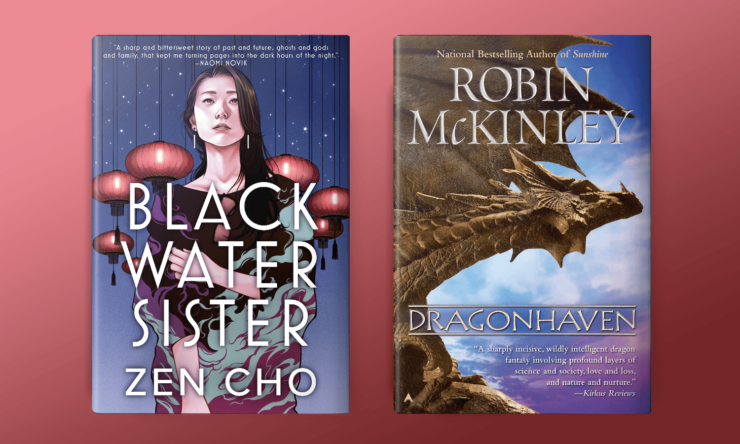I don’t think Zen Cho is capable of writing a book that isn’t a fascinating and stylish delight. Black Water Sister is her latest, and it’s a striking, appealing narrative of family, displacement, “home”-coming, coming-of-age… and ghosts.
Jess has grown up in the USA, the only daughter of Malaysian Chinese immigrants. Her memories of Malaysia are holiday snapshots. She’s just finished college, and her girlfriend has moved to Singapore. And now Jess is moving back to Malaysia with her parents in the wake of her father’s brush with cancer, to live with her father’s younger sister’s family in George Town. Jess is not out to her parents, or to any of her family, and she’s feeling dislocated enough with the move to Malaysia before she starts hearing voices.
One voice in particular. The voice of her mother’s mother. Her grandmother’s ghost is haunting Jess, and having a judgemental, nosy, managing and opinionated ghost would be bad enough. But her grandmother was, in life, the spirit medium for an angry, vengeful local deity, the Black Water Sister. And the plans of one of the richest businessmen in the city to redevelop her home sanctuary have offended her. Or so Jess’s grandmother says. (Possibly the businessman just offended Jess’s grandmother. She’s not a gentle, forgiving sort.) Grandmother means to use Jess to—somehow—prevent this.
Jess is not happy about it. (But you try arguing with a stubborn grandmother. They don’t get less stubborn when they’re dead, apparently.) She’s about to stumble into a George Town filled with spirits and histories she can barely understand—and discover things about her mother’s family that she never expected. (Grandmother was organised crime!) And find herself with a closer and more intimate relationship with an angry spirit than she ever really wanted: a spirit whose godhood comes from tragedy and murder.
Black Water Sister is a novel rooted in a specific place, but even more, a specific experience: the return to a “mother country” that one hardly knows and to family that are familiar strangers with complicated, impenetrable histories. It’s a story about growth and change, trust, honesty, and awkward family histories. It’s also generous, kind, and very much an affirming romp of a novel. I can’t recommend it highly enough.
I read Dragonhaven by Robin McKinley (published all the way back in 2007, I begin to feel old) because my wife told me about an odd book where the teenaged protagonist is constantly exhausted from parenting a newborn marsupial dragon (definitely endangered, also grows up to breathe fire) and spends most of the book in a dazed parental fugue. You may be surprised (or not) to hear that Dragonhaven is nonetheless a compelling read.
Jake is a fourteen-year-old resident at one of the very few dragon sanctuaries in the world. His father is the director: his mother is dead, her body having been discovered five months after she went missing on a research trip abroad. Jake has some serious grief issues related to his mother’s death, probably exacerbated by his limited social circle and his father’s stressed, busy life trying to keep things running (while also having his own grief to deal with).
There are many species that are called dragons, but only one true dragon species: very rare, and seldom sighted even by people who work in the dragon sanctuary/reservation. On a solo hike deep in the woods, Jake finds a dying dragon, killed by a poacher. One that’s just given birth. There’s only one survivor, an infant whose future survival is impossible unless Jake intervenes. (There are laws against both harming and helping dragons. The screwed-up legacy legislation is incredibly plausible.)
Jake doesn’t even think about it. Of course he won’t let the dying mother dragon down. He’ll help the baby!
…Parenthood, it turns out, is complicated. And hard work. Especially parenting the infant of an alien species about whose developmental stages you know very little. There’s a threat to the future of the reservation. There are revelations about the draconic species. There’s poor Jake, trying to keep a small, helpless (and rapidly growing) creature alive when it can’t bear to be parted from him hardly long enough to take a shower, and who, as it grows, could cause enormous problems. Jake doesn’t have time for outside problems: the ones in front of him are large enough.
Dragonhaven is a charming novel. I enjoyed it a lot.
What are you guys reading lately?
Liz Bourke is a cranky queer person who reads books. She holds a Ph.D in Classics from Trinity College, Dublin. Her first book, Sleeping With Monsters, a collection of reviews and criticism, was published in 2017 by Aqueduct Press. It was a finalist for the 2018 Locus Awards and was nominated for a 2018 Hugo Award in Best Related Work. She was a finalist for the inaugural 2020 Ignyte Critic Award, and has also been a finalist for the BSFA nonfiction award. Find her on Twitter. She supports the work of the Irish Refugee Council, the Transgender Equality Network Ireland, and the Abortion Rights Campaign.










